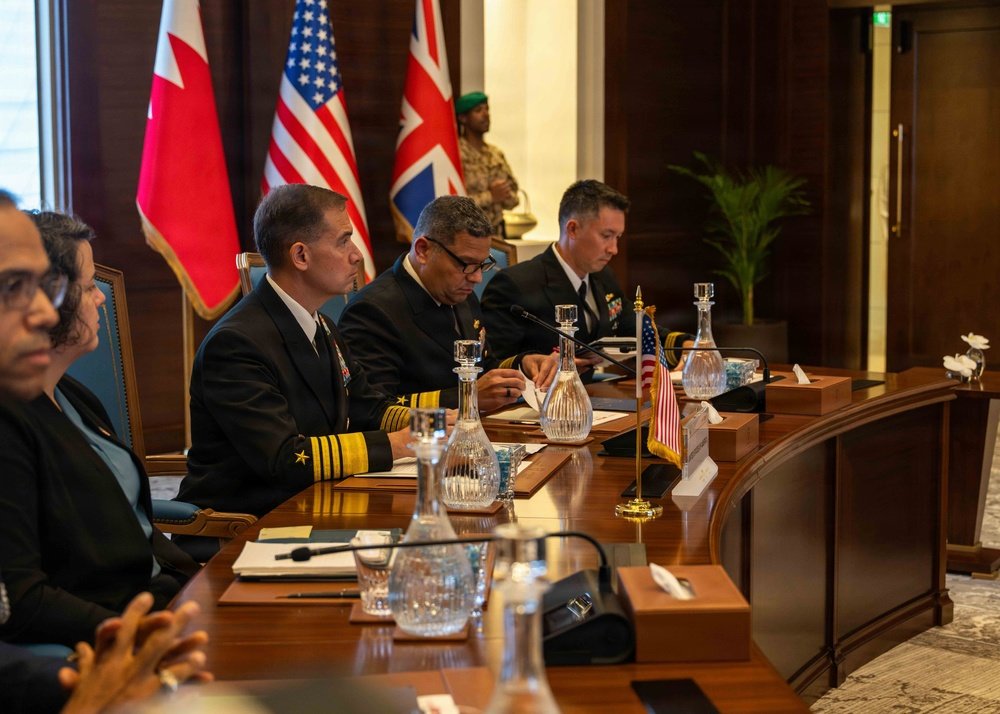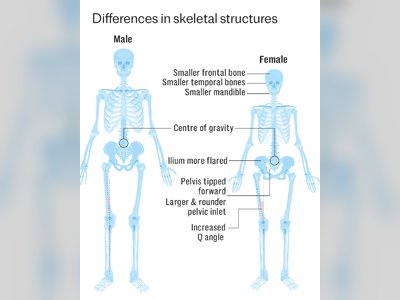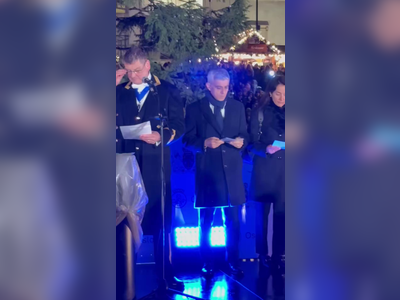
Bahrain Hosts Annual C-SIPA Defence Working Group With UK and US Engagement
The Kingdom of Bahrain, United Kingdom and United States reaffirm defence cooperation under the Comprehensive Security Integration and Prosperity Agreement
Representatives from the Kingdom of Bahrain, the United Kingdom and the United States met on November 1 in Bahrain for the annual Defence Working Group of the Comprehensive Security Integration and Prosperity Agreement (C-SIPA).
Among the attendees were His Highness Shaikh Nasser bin Hamad Al Khalifa, Bahraini National Security Advisor and Secretary General of the Supreme Defence Council; Air Chief Marshal Sir Richard Knighton, Chief of the Defence Staff of the United Kingdom; and Admiral Brad Cooper, Commander of U.S. Central Command.
During the meeting the parties welcomed the United Kingdom’s accession to C-SIPA and described the UK’s long-standing regional role as reinforcing the Agreement’s strategic objectives.
The three countries reiterated their shared commitment to consider any external aggression against the sovereignty, independence or territorial integrity of one party as a matter of grave concern under Article II of C-SIPA.
They also emphasised the importance of cooperating against hostile actors and malign activities that pose threats to regional security and global stability.
The discussions underlined C-SIPA’s position as a premier platform for defence coordination, integrating maritime, air and cyber-security efforts among the members.
Bahrain noted that as host of the UK’s naval presence in the Gulf and home to the United States Fifth Fleet, it remains pivotal to the tripartite framework’s interoperability and deterrence architecture.
The annual Defence Working Group serves as the forum to review progress on implementation of Article II’s defence and security commitments, including joint planning, intelligence-sharing and combined exercises.
Participants underscored the broader dimensions of C-SIPA, which not only encompasses defence cooperation but also economic, scientific and technological collaboration among like-minded states in pursuit of a more stable and prosperous region.
The United Kingdom’s accession marks the first formal expansion of the agreement, signalling a shift from a bilateral US–Bahrain pact towards a multilateral security architecture in the Middle East.
With the formalisation of this working-group meeting, the partners reaffirmed their intent to sustain regular high-level dialogue and to strengthen their collective capability to deter and respond to external threats by leveraging coordinated defence, intelligence and technological cooperation.
Among the attendees were His Highness Shaikh Nasser bin Hamad Al Khalifa, Bahraini National Security Advisor and Secretary General of the Supreme Defence Council; Air Chief Marshal Sir Richard Knighton, Chief of the Defence Staff of the United Kingdom; and Admiral Brad Cooper, Commander of U.S. Central Command.
During the meeting the parties welcomed the United Kingdom’s accession to C-SIPA and described the UK’s long-standing regional role as reinforcing the Agreement’s strategic objectives.
The three countries reiterated their shared commitment to consider any external aggression against the sovereignty, independence or territorial integrity of one party as a matter of grave concern under Article II of C-SIPA.
They also emphasised the importance of cooperating against hostile actors and malign activities that pose threats to regional security and global stability.
The discussions underlined C-SIPA’s position as a premier platform for defence coordination, integrating maritime, air and cyber-security efforts among the members.
Bahrain noted that as host of the UK’s naval presence in the Gulf and home to the United States Fifth Fleet, it remains pivotal to the tripartite framework’s interoperability and deterrence architecture.
The annual Defence Working Group serves as the forum to review progress on implementation of Article II’s defence and security commitments, including joint planning, intelligence-sharing and combined exercises.
Participants underscored the broader dimensions of C-SIPA, which not only encompasses defence cooperation but also economic, scientific and technological collaboration among like-minded states in pursuit of a more stable and prosperous region.
The United Kingdom’s accession marks the first formal expansion of the agreement, signalling a shift from a bilateral US–Bahrain pact towards a multilateral security architecture in the Middle East.
With the formalisation of this working-group meeting, the partners reaffirmed their intent to sustain regular high-level dialogue and to strengthen their collective capability to deter and respond to external threats by leveraging coordinated defence, intelligence and technological cooperation.











